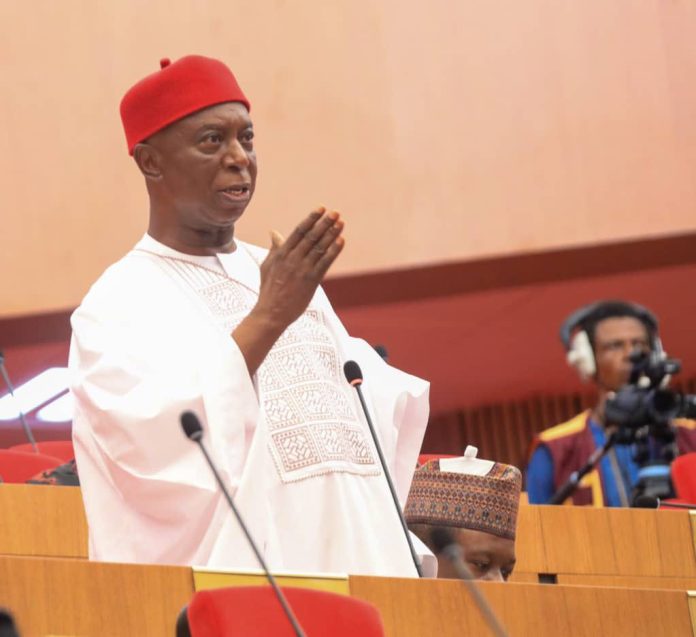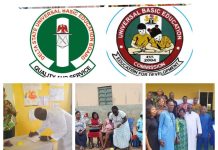BY EMMANUEL ENEBELI
Malaria, a persistent public health challenge, has long been a significant burden on Nigeria’s social and economic fabric. In Delta State, its effects have been particularly devastating, disrupting livelihoods and community well-being. Senator Ned Nwoko, representing Delta North in the National Assembly, has emerged as a central figure to combat this scourge.
Through his Prince Ned Nwoko Foundation and strategic alliances with global health institutions and local organizations like the Nigerian Association of Women Journalists (NAWOJ) in Delta State, he is championing an innovative, multi-faceted approach to malaria eradication.
The senator’s approach emphasizes African leadership in tackling a problem that disproportionately affects the continent. His foundation’s long-term strategy includes supporting the development of an anti-malaria vaccine through research funding.
In the short term, his campaign prioritizes national mobilization for environmental sanitation and fumigation. Plans for clean-up days, the establishment of recycling plants in every local government, and grassroots advocacy for behavioural changes in waste disposal are pivotal elements. By advocating for a National Day of Fumigation, Senator Nwoko’s campaign seeks to engage communities as active stakeholders, further enhancing the project’s sustainability.
This initiative represents a coordinated effort involving federal ministries of health and environment as key stakeholders. Town hall meetings, community-led sanitation appointments, and targeted interventions such as Indoor Residual Spraying (IRS) and larviciding are also integral. These measures aim to ensure that malaria prevention becomes embedded in community life, significantly reducing the disease’s prevalence in Delta State and beyond.
Malaria eradication promises transformative socio-economic benefits. In Delta North, where agriculture and small-scale enterprises dominate, malaria-related illnesses often incapacitate workers, reducing productivity and exacerbating poverty. Senator Nwoko’s initiative not only targets disease prevention but also revitalizes economic activity by enabling workers to remain healthy and productive. Families can redirect resources previously spent on medical care towards education, business, and other development priorities.
The education sector stands to gain significantly from this effort. Malaria is a leading cause of absenteeism among school-aged children, particularly during peak transmission periods. By reducing the incidence of the disease, Senator Nwoko’s efforts will help ensure that children remain in school, fostering a generation of learners better equipped to contribute to Delta North’s socio-economic growth. Improved educational outcomes also enhance the region’s potential to develop a more skilled workforce in the long term.
The senator’s work highlights the importance of collaborative governance. Partnerships with global organizations like the World Health Organization (WHO) and the Bill and Melinda Gates Foundation amplify the impact of local efforts. These collaborations demonstrate how global expertise can be harmonized with local solutions, creating a replicable model for addressing other public health challenges. The synergy between vaccine rollouts and community education further underscores the comprehensive nature of this initiative.
The campaign’s social impact extends beyond health benefits. Community clean-up exercises, health education, and vaccination programs foster a sense of civic responsibility and unity. These activities strengthen the social fabric of Delta North, building trust in government-led initiatives and encouraging collective action in other areas of development. Such grassroots mobilization aligns well with the broader goal of fostering sustainable development.
Public health improvements through malaria eradication will also enhance Delta North’s attractiveness as an investment destination. A healthier population reduces healthcare costs, increases productivity, and boosts economic stability, positioning the region as a hub for innovation and sustainable development. The ripple effects of a malaria-free environment extend to every facet of society, from improved business prospects to enhanced quality of life.
Senator Nwoko’s vision exemplifies the transformative power of health-focused leadership. His ability to integrate legislative advocacy, community engagement, and international collaboration reflects a holistic approach to governance. This initiative not only addresses immediate health challenges but also lays the groundwork for long-term socio-economic progress in Delta State and Nigeria at large.
The approval by Nigeria’s Federal Ministry of Health for the Prince Ned Nwoko Foundation to lead the implementation of the RTS,S malaria vaccine demonstrates the credibility and impact of this campaign. High-level consultations with stakeholders, including WHO, underline the global recognition of the foundation’s efforts. These partnerships have already resulted in a virtual side event at the United Nations General Assembly, further raising the profile of this groundbreaking initiative.
As malaria eradication efforts gain momentum, they set a precedent for tackling other pressing public health issues. Senator Nwoko’s leadership showcases the potential of collaborative governance in achieving significant milestones. His initiative not only reflects the aspirations of Delta North but also serves as a beacon of hope for a malaria-free Delta State, with implications for the entire nation.
To sustain these achievements, individuals, organizations, and governments at all levels need to collaborate in the fight against malaria. By prioritizing investments in healthcare, sanitation, and community-focused initiatives, Delta State and Nigeria can move closer to a future free from preventable diseases and their profound socio-economic impacts. The message is clear: through collective efforts, we can create healthier communities and unlock the nation’s full potential.
This vision is championed by the Prince Ned Nwoko Foundation, an initiative led by Senator Ned Nwoko, who represents Delta North in the National Assembly and has been instrumental in the groundbreaking success of the malaria vaccine discovery.
Emmanuel Ochonogor Enebeli, Anipr, CEO, Publisher, Entrepreneur, Public Relations Consultant and Media Strategist, enebelli@hotmail.com, +234 (806) 331 9057

















